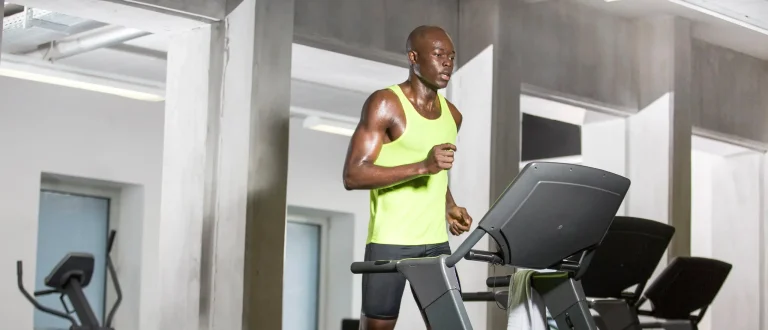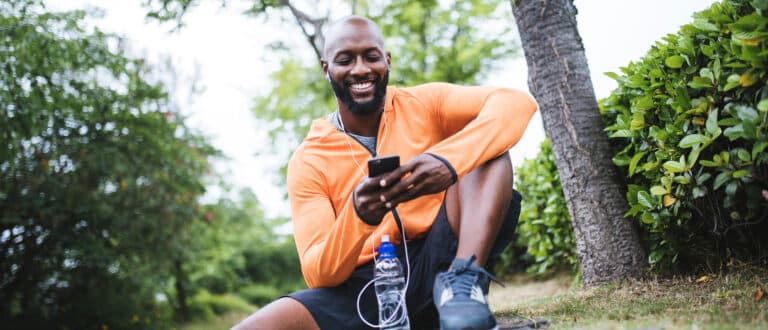
The Best Time of Day to Exercise, According to Your Body
Fast Facts
- Morning workouts might be better for weight loss and promote quality sleep.
- Afternoon and evening workouts offer performance and strength gains and might improve metabolic health.
- The best time to work out is the one you can stick to consistently.
Finding time to exercise can be challenging. Unlike Andrew Huberman, most of us don’t have time for a three-hour zone 2 workout. If you’re anything like us, you’re cramming workouts in during unusual hours just to get them in.
TikTok is here for the early morning vibes. The latest trend: five a.m. workouts.
One TikToker posted how she preps for her five a.m. workouts the night before, and another shared that her five a.m. workouts boost her energy and productivity, and give her better sleep.
Should you join them? Here’s everything you need to know about how the time of day affects your workout performance, results, and metabolic health. Plus, how to decide what time is best for you.
What Is the Best Time of Day to Workout?
For many fitness goals, there’s an ideal time to work out for maximum results. For example, if you want to lose weight, research suggests working out before breakfast is better (1). But if you’re chasing significant strength gains, studies show working out in the afternoon or evening has major perks (2). And, if it’s metabolic health you’re after, early evening exercise may have the upper hand (3).
However, if you already like working out at a certain time, many studies show that your chronotype (whether you’re an early bird or night owl) plays a role in when you perform best (4). Another suggests if your current schedule isn’t working, your body can adapt to training at different times of the day (5).
Your best bet is picking a time that works for you and sticking to it. For most people, the right time to exercise isn’t about how many calories you can burn or how much weight you can lift—it’s about finding a time that fits into your daily schedule.
Benefits of Working Out in the Morning
Maybe the early bird does get the worm. Beyond checking it off your to-do list, here are the major benefits of getting your workout in early in the day.
Be More Consistent
Appealing to your practical side—if you exercise in the morning, there’s less chance of something interfering with your workout. Last-minute social and work events can make working out in the evening complicated. Besides, many studies suggest you’re more likely to stick to a morning workout routine than one in the afternoon or evening (6, 7, 8).
Get Better Sleep
One study shows exercising in the morning will shift your circadian clock, making you more alert in the morning, and promoting better sleep at night (8). Quality sleep helps to facilitate muscle recovery and growth (9), meaning better gains.
Burn More Fat
Working out in the morning may help you lose more weight than working out in the afternoon (10). One study found morning exercise can burn up to 20 percent more body fat than working out later in the day (11).
Plus, you might be able to double down on weight loss efforts by skipping breakfast. One study discovered that people who worked out on an empty stomach first thing in the morning burned double the fat compared to those who ate breakfast first (1).
You might burn more fat after your workout, too. Another study suggests exercising before breakfast can increase fat oxidation for up to 24 hours (12).
Be More Productive
Many people claim an early morning workout makes them more productive all day long. Don’t believe them? One study suggests that morning exercise improves energy levels, alertness, focus, and decision-making—all factors that can translate to a more productive workday (13).
Morning Workout Considerations
If you’re planning to take full advantage of morning workouts, there are some considerations to get the most out of your routine.
Do a Longer Warmup
Your core body temperature is naturally lower in the morning, meaning you’ll need to warm up longer before a morning workout to achieve the same performance as in the afternoon or evening. Luckily, studies show a proper warmup can mitigate any time-of-day performance differences (2).
Fuel for Better Performance
Fasting before exercise might be ideal for weight loss, but it negatively affects performance. If you’re participating in high-demand activities like sprints or CrossFit, you’ll perform better when properly fueled. Aim to eat easily digestible carbs for quick energy (like sourdough bread), complex carbs for sustained energy (like blueberries), and something high protein and low fat to keep you satisfied (like greek yogurt) 45 to 60 minutes before your workout.
Benefits of Working Out in the Afternoon and Evening
Exercising later in the day has its advantages. Here are the top 6 reasons to workout in the afternoon or evening.
Improve Metabolic Health
Working out later in the day might be superior for metabolic health. One study found men who exercise in the evening had lower systolic blood pressure, and better fat oxidation (the breakdown of fatty acids) (14).
Another, published in Nature Communications, followed 92,000 people and linked afternoon exercise to a lower risk of death and heart disease than morning exercise (15). Same for those with mixed workout schedules. However, any exercise was better than no exercise—moderate to vigorous exercise at any time of day was associated with a decreased risk of dying from cancer or heart disease.
Evening exercise might also lower cholesterol and improve blood sugar control, per the results of one Diabetologia study (3). 20 overweight men were put on a greasy diet for five days, then put into one of three groups: those who exercised at 6:30 a.m., those who exercised at 6:30 p.m., and those who didn’t exercise.
Once they started exercising, the early morning exercisers didn’t see a meaningful reduction in their cholesterol levels or other biomarkers. But after five workouts, the evening exercisers saw lower cholesterol, improved cardiovascular health, and better blood sugar control.
Perform Better
Your body’s window for peak performance—when focus, strength, flexibility, and reaction time are all greatly enhanced—occurs in the late afternoon or early evening. One study confirmed this peak occurs in the afternoon from four to eight p.m. (2).
Many studies have found that exercise performance for short all-out workouts (think sprints, jumps, one rep max efforts), and isometric strength (like planks or wall sits) improves in the evening (2). Other studies suggest that timing workouts in the afternoon can improve skill-specific performance and athlete readiness in soccer and basketball players, too (16, 17).
Increase Testosterone Response
Cortisol and testosterone levels are elevated in the morning, hitting their peak around eight a.m.. Testosterone has repeatedly been linked with strength training adaptations, and higher levels of T appear preferential if you’re after gains (18). However, in the morning your elevated T has to compete with cortisol, which is linked to the breakdown of muscle tissue (18).
While elevated levels of testosterone might help to counter the effects of cortisol, studies suggest it’s not enough (19). Interestingly, an increased resistance exercise-induced T response seems to occur in the late afternoon, along with optimal adaptations to resistance training (muscle growth and strength increases)(19).
Boost Gains
If you’re looking to pack on the muscle, one study suggests people who work out in the evening gain more muscle mass from consistent training compared to people who worked out in the morning (20). Bonus: if you’re lifting heavy, another study found your grip strength is greater in the evening (21).
Fuel for Performance
Working out later in the day gives you time to fuel with regular meals to give you all the energy you need to perform your best in all-out workouts like sprinting, vigorous cardio, HIIT sessions, or heavy weight lifting where your performance is a top priority.
Reduce Injuries
Elevated body temperature and blood flow mean your muscles are less tense and more flexible, lowering your risk of a pulled muscle. Plus, a more alert mind means you can give more attention to your workout, avoiding slip-ups in form or lazy movement patterns that could contribute to pain or injury over time.
Afternoon and Evening Workout Considerations
If you’re a night owl by nature or thinking about making the switch, keep these considerations in mind.
May Affect Sleep
Working out later in the day may be good for performance, but it could impact your quality of sleep. One study found that working out from seven to 10 p.m. shifts your natural circadian clock later, which translates to later bedtimes and less overall sleep (22).
Another study suggests exercising vigorously less than an hour before bedtime can increase arousal, delay sleep, and disturb sleep quality (23). To avoid this reaction, work out in the early evening to give your body time to unwind.
Hard to Workout Fasted
Morning workouts are ideal for fasted exercise because you can fast while you’re asleep, and refuel right after your morning workout.
But fasting throughout the day is less practical. Odds are you’ll just feel crummy by the time you get around to your workout. Plus, it can be difficult to squeeze all of your daily fuel needs in after an afternoon or evening workout. If you’re aiming to maximize weight loss with fasted cardio, stick to morning workouts.
The Bottom Line
If your behavior doesn’t match your physiology the time of day you work out is a moot point. Establish a consistent schedule at a time that works for you to see benefits.
References
1. Edinburgh, R. et al (2020). Lipid Metabolism Links Nutrient-Exercise Timing to Insulin Sensitivity in Men Classified as Overweight or Obese. https://academic.oup.com/jcem/article/105/3/660/5599745
2.Mirizio, G. et al (2020). Time-of-Day Effects on Short-Duration Maximal Exercise Performance. https://www.nature.com/articles/s41598-020-66342-w
3. Moholdt, T. et al (2021). The Effect of Morning vs Evening Exercise Training on Glycaemic Control and Serum Metabolites in Overweight/Obese Men: A Randomized Trial. https://link.springer.com/article/10.1007/s00125-021-05477-5
4. Vitale, J. et al (2017). Chronotype, Physical Activity, and Sport Performance: A Systematic Review. https://pubmed.ncbi.nlm.nih.gov/28493061/
5. Pengelly, M. et al (2021). Player Chronotype Does Not Affect In-Game Performance During the Evening in Professional Male Basketball Players. https://www.ncbi.nlm.nih.gov/pmc/articles/PMC8700237/
6. Schumacher, L. et al (2020). Consistent Morning Exercise May Be Beneficial For Individuals With Obesity. https://www.ncbi.nlm.nih.gov/pmc/articles/PMC7492403/
7. Brooker, P. et al (2019). The Feasiability and Acceptability of Morning Versus Evening Exercise for Overweight and Obese Adults: A Randomized Controlled Trial. https://www.ncbi.nlm.nih.gov/pmc/articles/PMC6348200/
8. Fournier, M. et al (2017). Effects of Circadian Cortisol on the Development of a Health Habit. https://psycnet.apa.org/record/2017-27629-001
9. Vitale, J. et al (2019). The Role of the Molecular CLock in Promoting Skeletal Muscle Growth and Protecting Against Sarcopenia. https://www.mdpi.com/1422-0067/20/17/4318
10. Willis, E. et al (2019). The Effects of Exercise Session Timing on Weight Loss and Components of Energy Balance: Midwest Exercise Trial 2. https://www.nature.com/articles/s41366-019-0409-x
11. Gonzalez, J. et al (2013). Breakfast and Exercise Contingency Affect postprandial Metabolism and Energy Balance in Physically Active Males. https://pubmed.ncbi.nlm.nih.gov/23340006/
12. Iwayama, K. et al (2015). Exercise Increase 24-H Har Oxidation Only When It Is Performed Before Breakfast. https://www.ncbi.nlm.nih.gov/pmc/articles/PMC4703705/
13. Wheeler, M. et al (2020). Distinct Effect of Acute Exercise and Breaks in Sitting on Working Memory and Executive Function in Older Adults: a Three-Arm, Randomized Cross-Over Trial to Evaluate the Effects of Exercise With and Without Breaks in Sitting on Cognition. https://bjsm.bmj.com/content/54/13/776.citation-tools
14. Acierto, P. et al (2022). Morning Exercise Reduces Abdominal Fat and Blood Pressure in Women, Evening Exercise Increases Muscular Performance in Women and Lowers Blood Pressure in Men. https://www.frontiersin.org/articles/10.3389/fphys.2022.893783/full
15. Feng, H. et al (2023). Associations of timing of physical activity with all-cause and cause-specific mortality in a prospective cohort study. https://www.nature.com/articles/s41467-023-36546-5
16. Heishman, A. et al (2017). Comparing Performance During Morning vs. Afternoon Training Sessions in Intercollegiate Basketball Players. https://www.ncbi.nlm.nih.gov/pmc/articles/PMC5441887/
17. Rahnama, N. et al (2009). Diurnal Variation on the Performance of Soccer-Specific Skills. https://www.researchgate.net/publication/237798108_Diurnal_Variation_on_the_Performance_of_Soccer-Specific_Skills
18. Seo, D. et al (2013). Morning and Evening Exercise. https://www.ncbi.nlm.nih.gov/pmc/articles/PMC5481716/
19. Hayes, L. et al (2010). Interactions of Cortisol, Testosterone, and Resistance Training: Influence of Circadian Rhythms. https://www.tandfonline.com/doi/abs/10.3109/07420521003778773?journalCode=icbi20
20. Kuusmaa, M. et al (2016). Effects of Morning versus Evening Combined Strength and Endurance Training on Physical Performance, Muscle Hypertrophy, and Serum Hormone Concentrations. https://cdnsciencepub.com/doi/10.1139/apnm-2016-0271
21. Douglas, C. et al (2021). Time of Day and Muscle Strength: A Circadian Output? https://www.ncbi.nlm.nih.gov/pmc/articles/PMC8425416/
22. Youngstedt, S et al (2019). Human Circadian Phase-Response Curves for Exercise. https://physoc.onlinelibrary.wiley.com/doi/full/10.1113/JP276943
23. Stutz, J. et al (2019). Effects of Evening Exercise on Sleep in Healthy Participants: A Systematic Review and Meta-Analysis. https://link.springer.com/article/10.1007/s40279-018-1015-0

















